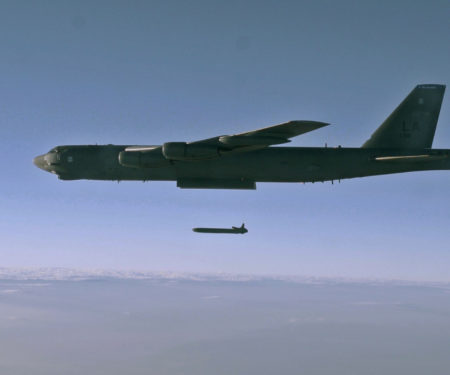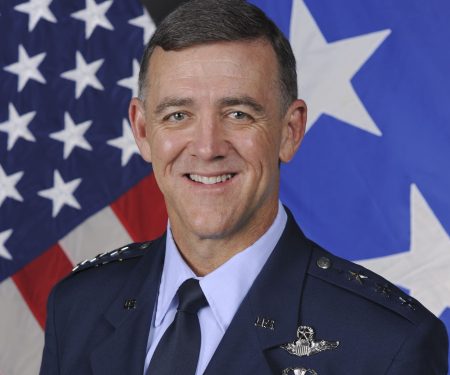Radar Sweep
To Combat Bullying and Extremism, Air Force Academy Turns to Social Media Sleuthing
After years of internal and external alarms that the military isn’t doing enough to address hate and extremism, an obscure federal contract may suggest a new approach: monitoring the social media of Air Force Academy cadets, staffers—and anyone else around the campus. Last month, the Air Force struck a contract for digital monitoring to identify hate speech, cyberbullying, sexual harassment and extremism at its Colorado Springs academy. The goal is to “combat cadet conduct in digital mediums that has the potential to negatively impact culture and climate.”
Congress Passes Defense Spending Bill after Months of Delays
Congress early on March 23 passed the fiscal 2024 defense spending bill, nearly halfway through the fiscal year that began in October and hours after funding for the Defense Department and several other agencies expired on Friday. The $825 billion bill will allow the Pentagon to launch the initiatives and begin the procurement of key weapons systems it had planned for this year. For more than five months, Congress had funded the Defense Department at FY23 levels via a series of stopgap measures, avoiding a government shutdown but hampering those initiatives and procurement plans.
Ukraine War: Five Dead and a Million without Power after Wave of Russian Strikes
A million people are without power across Ukraine after Russian missiles targeted energy infrastructure. There is no electricity in the second-largest city of Kharkiv, the regional head says, and more than 53,000 households in Odesa are without power. Ukraine’s energy minister, German Galushchenko, accused Russia of trying to provoke “a large-scale failure of the country's energy system.”
PODCAST: Understanding the Air Force and Space Force Budget: Leadership Perspective
In episode 174 of the Aerospace Advantage, Doug Birkey and members of the Mitchell team speak to Lt. Gen. Rick Moore, deputy chief of staff for plans and programs, and Lt. Gen. Shawn Bratton, deputy chief of space operations for strategy, plans, programs, and requirements. The spending caps passed by Congress make this year’s budget request picture exceedingly challenging. Moore and Bratton, the leaders charged with building their respective service budget requests, shed light on how specific programs were resourced, while also discussing how they balanced factors like readiness and modernization.
Private Satellite Operators Make Case for Helping Military Track Ground Targets
The U.S. Air Force and the Space Force are working with the National Reconnaissance Office to develop a dedicated constellation of sensor satellites specifically designed for Ground Moving Target Indication (GMTI). This technology would replace the large radar surveillance aircraft like JSTARS previously used by the Air Force to track the movement of troops and vehicles on the ground. At the same time, hundreds of commercial remote sensing satellites are orbiting the Earth, providing unprecedented imaging capabilities, leading industry executives to question whether the military should leverage these commercial systems for GMTI.
F-35A’s Beleaguered 25mm Cannon Is Finally ‘Effective’
The 25mm automatic cannon nestled inside the F-35A variant of the Joint Strike Fighter is now deemed to be an effective weapon. For years, a host of issues had left these stealth fighters unable to shoot straight. Problems with the 25mm cannon have also been a particularly notable talking point in the still-controversial debate over plans to supplant the venerable A-10 Warthog ground attack jet with the F-35A.
Nearly 50 JWCC Task Orders Awarded Last Year; Dozens More in the Pipeline
The Department of Defense has awarded close to 50 task orders in the last year for its enterprise cloud capability, according to Pentagon Chief Information Officer John Sherman. More than 47 task orders were awarded by the Defense Information Systems Agency, which runs the contract, and over 50 more are in the pipeline presently, Sherman told the House Armed Services Cyber, Information Technologies, and Innovation Subcommittee.
Finding Money: How the Pentagon Dug Down and Found $300M for Ukraine But is Still Deep in the Red
Even with a budget of more than $800 billion and the ability to buy millions of weapons and pieces of equipment every year, the Pentagon sometimes can find a few dollars in the couch cushions. Or, make that $300 million. For the second time in nine months, Defense Department accountants have sharpened their pencils, pored over their books, and found a way to send more military aid to Ukraine.
Air Force to Add 5 New Compass Call Electronic-Attack Planes in 2025
The Air Force plans to add five EA-37B Compass Call electronic-attack aircraft to its arsenal in the coming fiscal year, as it swaps out the aging EC-130H fleet for a smaller, modern set of airborne jammers. The service noted their arrival in budget documents released March 11. The first of 10 EA-37Bs was delivered to the Air Force last year for testing—two years later than anticipated—before heading to its eventual home at Davis-Monthan Air Force Base, Ariz. Delivery of the first mission-ready jet is expected sometime in 2024.
Space Force, IC’s Battle over Commercial ISR Reignites as Appropriators Add Fuel
Over the past year, the three key agency players with control over US space-based intelligence, surveillance and reconnaissance (ISR)—the National Reconnaissance Office (NRO), the National Geospatial-Intelligence Agency (NGA), and the Space Force—have been working toward an agreement on how to split the power to buy products and services from commercial satellite operators.
SPACECOM Wants $1.2B in FY25 for ‘Unfunded Priorities,’ Most Classified
U.S. Space Command has asked Congress for $1.2 billion in fiscal 2025 to fund efforts either not included or not fully supported in the official Defense Department budget. Most of the programs included in the annual wish list obtained by Breaking Defense are classified, thus the document doesn’t provide many details about each one. For example, there are three lines in the SPACECOM spreadsheet labeled simply Classified Program A, B, and C, for which the command is asking a total of $704 million.
Boom’s First Test Flight Could Signal the Return of Supersonic Air Travel
Aviation startup Boom Supersonic took a major step today toward its goal of returning commercial supersonic aviation to the skies, after the company’s prototype aircraft, the XB-1, left the ground for the first time this week. The short, subsonic flight over the Mojave Desert came years later than expected, but it shows that Boom is at least still making progress.





